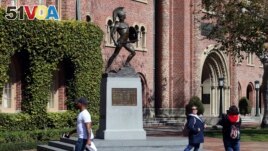13 April 2024
The cost of attending a top college in the United States could be as much as $95,000 this year. That total includes tuition as well as meals and living space at the school.
But college officials say they are helping students with financial support. And those from poor families may be required to pay only 10 percent of the costs.
Wellesley College, a private women's school near Boston, Massachusetts, will cost $92,000 for 2024-2025. The college's famous graduates include former First Lady Hillary Clinton, Secretary of State Madeleine Albright and television broadcaster Diane Sawyer.

FILE - Students walk in front of the Trojan statue at the University of Southern California. The school will be one of the most costly in the U.S. next year. (AP Photo/Reed Saxon, File)
Philip Levine is an economics professor at Wellesley. Levine said the figure "clearly is a lot of money, and it catches people's attention, for sure." He added, "But for most people, that is not how much they're going to pay."
Wellesley says nearly 60 percent of its students receive financial aid. And the average amount of aid is $62,000, cutting the total cost by two-thirds.
For American students, the amount of financial aid makes a difference. This year, however, many are concerned because the U.S. Department of Education is having major problems with a new online form, called the FAFSA. The document helps students apply for financial aid.
One concern is that American-born children of undocumented immigrants must provide information about their parents. But the parents may not have the needed identity documentation or may be worried about showing themselves to the government.
Mark Kantrowitz is a financial aid expert. He called the new online process "an absolute disaster."
Kantrowitz said the problems might prevent students from applying for aid. That, in turn, could lower the number of students going to college and force some schools to close.
Levine of Wellesley said his research has shown that students from lower-income families have been receiving more financial aid over the past six years. But he worries that the difference between the advertised cost and the actual cost will keep some students from applying to top colleges like Wellesley.
Levine said, "People should be making educational decisions based on the actual cost they have to pay..."
Schools on the list of the most costly include the University of Southern California, Harvey Mudd College of California, the University of Pennsylvania, Brown University, Dartmouth College and Boston University.
Other top colleges, including Columbia University and the University of Chicago, have not listed their cost of attendance but they could turn out to be over $90,000 as well.
Harvard University says its cost of attendance will be $91,000 next year. But the school notes that the average cost for families is only $13,000 and many pay nothing at all. Harvard can support many of its students because its endowment is more than $50 billion, the largest of any university in the U.S.
The College Board is a nonprofit education organization that conducts the SAT college admission test. The group's research shows the average cost at private colleges and universities last year was $60,000. At public colleges and universities, the cost was $29,000 for students from the same state; it was $47,000 for out-of-state students.
Kantrowitz said that although many receive financial aid, most students still need an additional $10,000 for college each year. "So families are forced to borrow that money or come up with that money from some other source," he added.
Even with the rising costs, Kantrowitz said he believes college is still a good investment – as long as borrowing does not get out of control and students complete their studies.
He warns, "if you drop out, you have the debt, but not the degree that can help you repay the debt."
I'm Dan Friedell.
Dan Friedell adapted this story for Learning English based on a report by the Associated Press.
______________________________________________
Words in This Story
tuition –n. the cost paid for the classes given at a school
graduate –n. a person who received a degree from a school
apply –v. to provide documents in order to be considered for entry to a school
absolute –adj. the highest or greatest amount without a debate
income –n. the amount of money earned by a person or family in a year or period of time
endowment –n. the money a university or other organization has in order to fund its operations and investments
admission –adj. describing the process of letting someone into a school or club
drop out –v. to leave a school without completing a study program and getting a degree